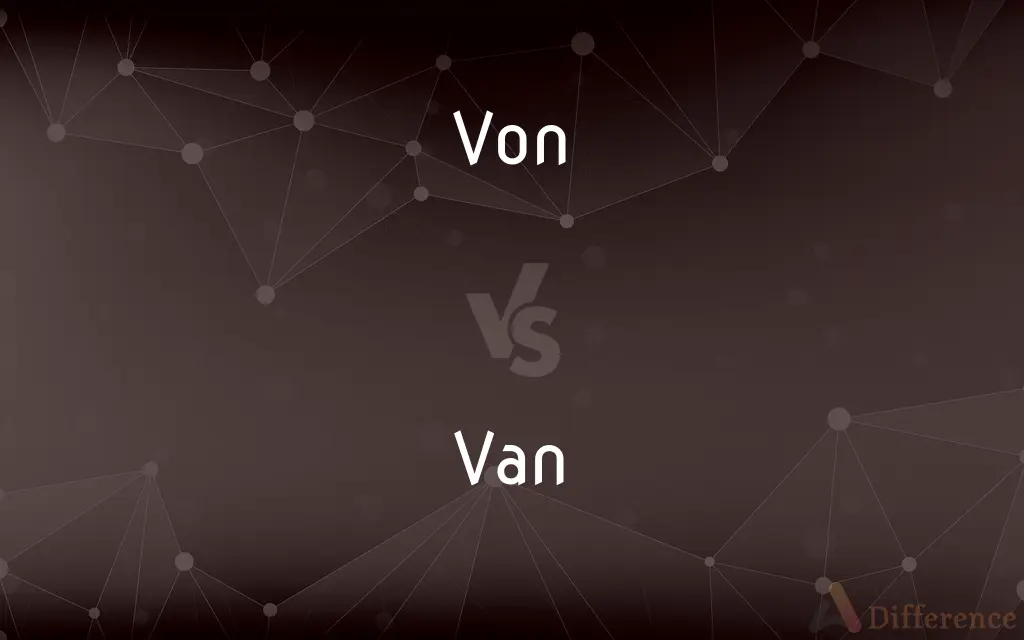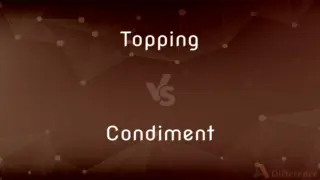Von vs. Van — What's the Difference?
By Tayyaba Rehman — Updated on October 30, 2023
"Von" is a German preposition meaning "from" or "of" and is often used in noble titles, while "Van" is Dutch, meaning "from" and is commonly seen in surnames.

Difference Between Von and Van
Table of Contents
ADVERTISEMENT
Key Differences
"Von" and "Van" are both used in surnames and typically signify nobility or geographical origin. While "Von" has its roots in German-speaking regions, "Van" is prominent in Dutch-speaking areas. For example, "Von Trapp" suggests a German origin, while "Van Gogh" indicates Dutch ancestry.
The presence of "Von" in a name often implies nobility in Germanic cultures. "Van", on the other hand, does not necessarily carry a noble connotation in Dutch culture, but rather points to geographic origin. Thus, while "Von Braun" might suggest a noble lineage, "Van der Waals" just points to a location.
In the context of language and usage, "Von" is a German word that translates to "from" or "of" in English. Conversely, "Van" is a Dutch term that primarily translates to "from." While they have similar meanings, they belong to different languages.
Beyond surnames, both "Von" and "Van" have their respective uses in their native languages. In German, "Von" serves as a preposition in various contexts, indicating origin or possession. In contrast, "Van" in Dutch, outside of surnames, is primarily a preposition denoting origin.
Interestingly, while "Von" and "Van" serve as indicators of origin in names, they're not exclusively European. They have been adopted and adapted in names across the globe due to historical connections, migrations, and influences.
ADVERTISEMENT
Comparison Chart
Origin Language
German
Dutch
Meaning in English
"from" or "of"
"from"
Noble Connotation
Often implies nobility in German surnames
Does not necessarily imply nobility in Dutch surnames
Usage in Surnames
E.g., Von Trapp, Von Braun
E.g., Van Gogh, Van der Waals
Role in Language
Preposition indicating origin or possession in German
Preposition indicating origin in Dutch
Compare with Definitions
Von
Suggests geographical origin in German surnames.
Wolfgang von Goethe, from the Goethe region.
Van
A Dutch preposition.
The painting is van Rembrandt.
Von
Indicates noble ancestry in German surnames.
Baroness Maria von Trapp.
Van
Indicates geographical origin in Dutch surnames.
Vincent van Gogh, perhaps from a region named Gogh.
Von
Used in titles and to denote possession.
The theories von Neumann presented were groundbreaking.
Van
Reflects Dutch heritage or lineage.
The Van Dam family has a long history in the town.
Von
A German preposition.
The book is von Maria.
Van
A van is a type of road vehicle used for transporting goods or people. Depending on the type of van, it can be bigger or smaller than a truck and SUV, and bigger than a common car.
Von
Reflects German heritage or lineage.
The von Braun family has lived here for generations.
Van
An enclosed boxlike motor vehicle having rear or side doors and side panels especially for transporting people.
Von
The term von [fɔn] is used in German language surnames either as a nobiliary particle indicating a noble patrilineality, or as a simple preposition used by commoners that means of or from. Nobility directories like the Almanach de Gotha often abbreviate the noble term von to v.
Van
A covered or enclosed truck or wagon often used for transporting goods or livestock.
Van
Chiefly British A closed railroad car used for carrying baggage or freight.
Van
The vanguard; the forefront.
Van
A wing.
Van
A winnowing device, such as a fan.
Van
To transport by van
Vanned the horses to the racetrack.
Van
To drive or travel in a van
Vanned around the country.
Van
A covered motor vehicle used to carry goods or (normally less than ten) persons, usually roughly cuboid in shape, longer and higher than a car but relatively smaller than a truck/lorry or a bus.
The van sped down the road.
Van
(British) An enclosed railway vehicle for transport of goods, such as a boxcar/box van.
Van
(dated) A light wagon, either covered or open, used by tradesmen and others for the transportation of goods.
Van
(aerospace) A large towable vehicle equipped for the repair of structures that cannot easily be moved.
Van
Clipping of vanguard
Van
(mining) A shovel used in cleansing ore.
Van
A fan or other contrivance, such as a sieve, for winnowing grain.
Van
A wing with which the air is beaten.
Van
(transitive) To transport in a van or similar vehicle (especially of horses).
Van
Of law enforcement: to arrest (not necessarily in a van; derived from party van).
Van
(mining) To wash or cleanse, as a small portion of ore, on a shovel.
Van
The front of an army; the first line or leading column; also, the front line or foremost division of a fleet, either in sailing or in battle.
Standards and gonfalons, twixt van and rear,Stream in the air.
Van
A shovel used in cleansing ore.
Van
A light wagon, either covered or open, used by tradesmen and others for the transportation of goods.
Van
A large covered wagon for moving furniture, etc., also for conveying wild beasts, etc., for exhibition.
Van
A closed railway car for baggage. See the Note under Car, 2.
Van
A fan or other contrivance, as a sieve, for winnowing grain.
Van
A wing with which the air is beaten.
He wheeled in air, and stretched his vans in vain;His vans no longer could his flight sustain.
Van
To wash or cleanse, as a small portion of ore, on a shovel.
Van
To fan, or to cleanse by fanning; to winnow.
Van
Any creative group active in the innovation and application of new concepts and techniques in a given field (especially in the arts)
Van
The leading units moving at the head of an army
Van
A camper equipped with living quarters
Van
A truck with an enclosed cargo space
Van
Commonly found in surnames to denote "from" a specific place.
Jan van der Meer.
Van
Does not imply nobility but denotes origin.
Peter van Houten is from the Houten region.
Common Curiosities
Is "Von" used to imply nobility in German names?
Yes, "Von" in German surnames often implies a noble lineage.
What's the primary meaning of "Van" in English?
"Van" translates to "from" in English.
Does "Von" always imply nobility?
Not always, but in German surnames, it often does.
Which word, "Von" or "Van", is associated with the Dutch language?
"Van" is associated with the Dutch language.
What is the English equivalent of "Von"?
"Von" primarily translates to "from" or "of" in English.
What is the primary language of origin for "Von"?
"Von" originates from the German language.
Does "Van" suggest nobility in Dutch culture?
No, "Van" primarily indicates geographical origin in Dutch surnames.
In which language is "Van" a preposition?
"Van" is a preposition in the Dutch language.
Can "Von" and "Van" be found in surnames outside Europe?
Yes, due to historical connections and migrations, both can be found globally.
Is "Van" used outside of surnames in Dutch?
Yes, as a preposition indicating origin.
Is "Von" a preposition in German?
Yes, "Von" is a preposition in German, indicating origin or possession.
Can "Van" be used in non-Dutch surnames?
Yes, while its origins are Dutch, it's been adopted in various cultures.
How do you differentiate the cultural or linguistic background using "Von" or "Van"?
"Von" typically indicates German origins, while "Van" suggests Dutch origins.
Are "Von" and "Van" interchangeable in surnames?
No, they are distinct and pertain to different linguistic and cultural backgrounds.
Does every surname with "Von" indicate the person is of noble descent?
Not necessarily, but it often implies nobility in German context.
Share Your Discovery

Previous Comparison
Topping vs. Condiment
Next Comparison
Lynx vs. TigerAuthor Spotlight
Written by
Tayyaba RehmanTayyaba Rehman is a distinguished writer, currently serving as a primary contributor to askdifference.com. As a researcher in semantics and etymology, Tayyaba's passion for the complexity of languages and their distinctions has found a perfect home on the platform. Tayyaba delves into the intricacies of language, distinguishing between commonly confused words and phrases, thereby providing clarity for readers worldwide.















































